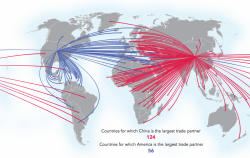Fear Internationalization? It Could Mean Financial Security

Fear Internationalization? It Could Mean Financial Security
Written by Jeff Thomas (CLICK FOR ORIGINAL)
In the early sixteenth century, the Hunt-Lenox globe was drawn, showing uncharted (and presumably dangerous) areas, marked with the warning: “HIC SVNT DRACONES” – “Here are Dragons.”
